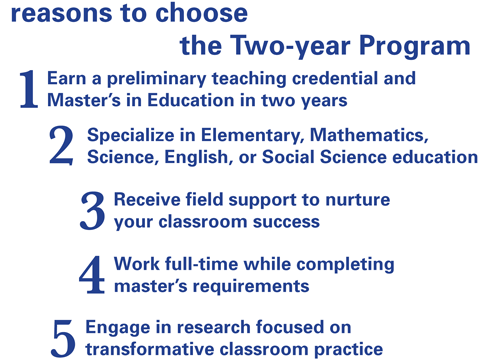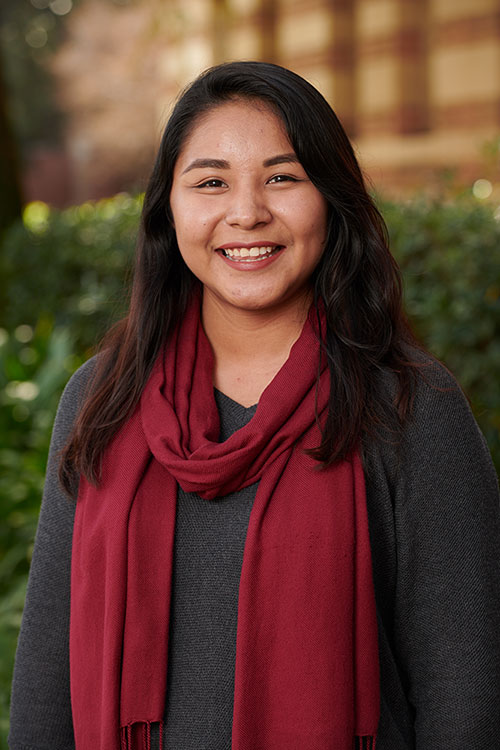When I was looking for a Teacher Education Program, I was looking for a program whose values aligned with mine.
I don’t see teaching as a job. I see teaching as part of who I am and as a way to enact change in this world.”
Center X offers a two-year program open to college graduates, for aspiring teachers interested in a university-based course of graduate study and full-year urban teaching residency.
The two-year graduate program offers specialized urban teacher preparation in the form of a two-year intensive Master of Education (M.Ed.) program in teaching for social justice in urban communities. This work is guided by our mission to “provide high quality pre-service education and to radically improve urban schooling for California’s racially, culturally, and linguistically diverse children.”
The two-year graduate program provides an opportunity for qualified students to obtain both a California teaching credential and an M.Ed. in a combined, full-time program that maintains strict academic and professional expectations and practice.

We substantiate our vision of educational change through teaching and learning that provide students the skills, dispositions, and insights they need to recognize and subvert social injustice across their academic and life trajectories. Thus, we advocate approaches to teaching and learning that recognize and value students’ assets, provide them multiple forms of participation, facilitate critical thinking, motivate them to learn, reveal high academic and personal expectations, and reflect culturally relevant pedagogies. In sum, TEP “strives to prepare teachers to have the commitment, capacity, and resilience to promote social justice, caring, and instructional equity in low-income, urban schools and communities.”
We refer to our first-year students as novices and their charge is to complete coursework and begin student teaching in the program’s partnership schools to meet California’s teacher credentialing requirements. These partner districts often lack certified teachers and primarily serve low-income culturally and linguistically diverse students of color. During the first year, novices engage in inquiry-based courses, collaborative projects, and dialogues regarding what it means to be a social justice educator in urban Los Angeles.
Novices participate in an Observation and Participation experience during which they draw on this experience to reflect on teaching and learning practices, curriculum development, and the social and political dimensions of teaching. They also complete two student teaching assignments during their novice year in conjunction with courses that facilitate our graduate students’ understanding of social, cultural, and psychological theories of learning and the content area methods that best reflect such theoretical approaches. Towards the end of their novice year, our graduate students complete a final edTPA to fulfill the credential requirements for the state of California. The edTPA requires students to complete Teaching Events during which they document and analyze their own teaching practices.
Second-year students, to whom we refer as residents, assume paid teaching positions in partner school districts and complete an inquiry-based research project in which they examine and reflect on their own classroom practices to complete their M.Ed. requirements. They receive continued support from their Faculty Advisors during a weekly Resident Seminar and begin the inquiry process with the support of their peers and Advisors. Students receive their M.Ed. after completing their research project in which they connect theoretical perspectives and methodologies that reflect their beliefs about teaching and learning in their own classrooms and the relationship between practice and student achievement.
To learn more about the Two-Year Graduate Program, please contact us.
…innovative strategies and strong subject matter knowledge. TEP students’ high expectations are tied to goals for student empowerment. That is how they enact their social justice beliefs.
– Sheila Lane, Former TEP Faculty
I was challenged to deeply examine societal norms and systemic inequities, as well as my own prejudices and conditioned beliefs in an effort to eliminate the replication of those systems in my own classroom while promoting a community of caring, fairness and equality.
– Meteka Bullard, TEP Grad

When I was looking for a Teacher Education Program, I was looking for a program whose values aligned with mine.
I don’t see teaching as a job. I see teaching as part of who I am and as a way to enact change in this world.”